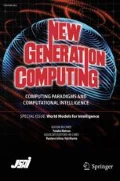Abstract
A pattern is a finite string of constants and variables (cf. [1]). The language of a pattern is the set of all strings which can be obtained by substituting non-null strings of constants for the variables of the pattern. In the present paper, we consider the problem of learning pattern languages from examples. As a main result we present an inconsistent polynomial-time algorithm which identifies every pattern language in the limit. Furthermore, we investigate inference of arbitrary pattern languages within the framework of learning from good examples. Finally, we show that every pattern language can be identified in polynomial time from polynomially many disjointness queries, only.
Similar content being viewed by others
References
D. Angluin. Finding Patterns Common to a Set of Strings.J. of Comp. and Syst. Sciences, 21:46–62, 1980.
D. Angluin. Queries and Concept Learning.Machine Learning, 2:319–342, 1988.
D. Angluin and C.H. Smith. A Survey of Inductive Inference: Theory and Methods.Computing Surveys, 15:237–269, 1983.
L. Blum and M. Blum. Towards a Mathematical Theory of Inductive Inference.Inf. and Control, 28:125–155, 1975.
R. Freivalds, E.B. Kinber, and R. Wiehagen. Inductive Inference from Good Examples. In K. Jantke, editor,Analogical and Inductive Inference 1989, pages 1–17, LNAI 397, Springer-Verlag, 1989.
E.M. Gold. Language Identification in the Limit.Inf. and Control, 10:447–474, 1967.
R. Klette and R. Wiehagen. Research in the Theory of Inductive Inference by GDR Mathematicians — a Survey.Inf. Sciences, 22:149–169, 1980.
S. Lange. Consistent Polynomial-time Inference ofk-Variable Pattern Languages.Technical Report, Leipzig University of Technology, submitted to theFirst International Workshop on Nonmonotonic and Inductive Logics, Karlsruhe, 1990.
A. Marron. Learning Pattern Languages from a Single Initial Example and from Queries. In D. Haussler and L. Pitt, editors,COLT ’88, pages 345–358, Morgan Kaufmann Publ., 1988.
T. Shinohara. Polynomial-time Inference of Extended Regular Pattern Languages. In E. Goto, K. Furukawa, R. Nakajima, I. Nakata, and A. Yonezawa, editors,RIMS Symp. on Software Sci. and Engin., pages 115–127, LNCS 147, Springer-Verlag, 1983.
Author information
Authors and Affiliations
About this article
Cite this article
Lange, S., Wiehagen, R. Polynomial-time inference of arbitrary pattern languages. NGCO 8, 361–370 (1991). https://doi.org/10.1007/BF03037093
Received:
Issue Date:
DOI: https://doi.org/10.1007/BF03037093




